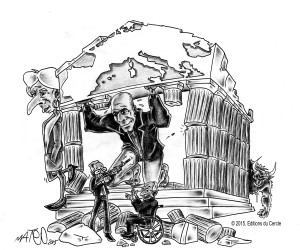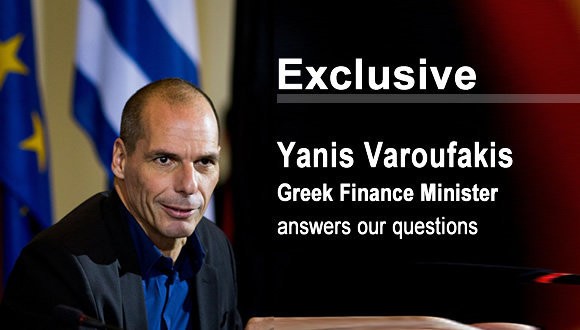Exclusive Interview Yanis Varoufakis – LeContrarien.com – 03/03/2015
Charles Sannat : You are a self-proclaimed “contrarian”. Can you explain?
Yanis Varoufakis : In a world where the dominant paradigm is detrimental to shared prosperity, justice and liberty it is incumbent on those who care about these principles to oppose what passes as established opinion. Opposing views and rules for the sake of it is pointless and dangerous. But to oppose that which systematically undermines a civilised society is a moral duty.
CS : As we see them from France, the Greek debt crisis negotiations seem to present no common ground, not a single point of agreement between Europe and Greece, and the European institutions appear inflexible. Is this a wrong impression or reality?
YV : The common ground most certainly exists. Indeed it is in the interests of everyone in Europe, including our creditors, that Greece returns to inclusive growth. The problem seems to me that the prevailing policies remain entrenched because of an understandable, even if misguided, determination not to admit that the ‘remedy’ of the past 5 years was making a bad thing worse.
CS : Because, if this is real, it means Europe has become a disciplinarian, an all-powerful drill sergeant, not only for Greece, but by extension for all the fiscally stressed countries of the Eurozone.
YV : Currently my job to build bridges within a Europe that puts rules above macroeconomic logic and the current arrangements above a vision of how Europe, and the Eurozone, ought to be designed. These bridges are important because without them millions of Europeans suffer unnecessarily while ‘Europe’ is becoming unpopular amongst Europeans, to the benefit of ultra-nationalists and biggots.
CS : In my analysis of the state of Greece’s economy (and many people think like me), the Greek debt simply cannot be reimbursed. The reimbursement seems to be a sticking point in the current negotiations. But we all know that the debt cannot be reimbursed in full. Why is Europe pulling this red herring when the priority should be to resolve the overbearing humanitarian crisis in your country?
YV : Perhaps the saddest part of this is that, in practice, everyone agrees. I am constantly told that the word haircut is toxic politically but, at the same time, I am told that our creditors would be prepared to discuss a substantial elongation of maturities with a concomitant reduction of interest rates – which is, of course, a substantial… haircut. Puzzlingly when we counter-propose nominal GDP indexed bonds, that would potentially return more value to our creditors, we are turned down. The only explanation for this puzzle is that the question of debt has little to do with… debt. That our debt is a ‘control variable’, as mathematicians would say, in the context of a ‘planning’ exercise whose purpose is to maximise political authority over deficit nations. If there is another explanation I would love to hear it.
CS : You are today backing the idea that Greece should stay in the eurozone. Our eurozone economies being heterogeneous, if there is no mecanism to harmonise them, I think the Euro is condemned. Why then do you think staying in the Eurozone is important?
YV : Because I cannot think of any mechanism by which we can dissolve the Eurozone without a massive crisis that will further burden the already dispossessed and those who have born the greatest burdens of the euro crisis. Could the Eurozone be stabilised without further austerity-driven pain? I think so and this is why we, together with Stuart Holland and Jamie Galbraith, put so much effort in our Modest Proposal for Resolving the Euro Crisis.
CS : Nobody wants to be the undertaker of the euro, yet Greece could be the first country to exit it. What do you think of this hypothesis?
YV : Mario Draghi last November said that for the euro to succeed anywhere it must succeed everywhere. I think he is right. In this context attempts to use Grexit as a threat are, whichever side they come from, undermine the already fragile Eurozone and thus constitute frightfully irresponsible moves.
 CS : In your opinion, should things come to a split within the Eurozone between the strong and the weak countries, wouldn’t a German exit from the Euro be more operationally (econimically) effective, the other countries being then in a position to carry on with the common currency without Germany?
CS : In your opinion, should things come to a split within the Eurozone between the strong and the weak countries, wouldn’t a German exit from the Euro be more operationally (econimically) effective, the other countries being then in a position to carry on with the common currency without Germany?
YV : In the hypothetical case of a Euro Area split there is no doubt that the exit of a surplus country is far preferable to that of a deficit nation exiting. When a country that has a current account surplus leaves a monetary union its currency rises as capital inflows mount. This flow of balances compensates for the losses from claims on assets in the countries remaining in the union. While a recession is on the cards, due to the rise in the exchange rate and the consequent loss of markets, the resulting situation is palatable compared to the implosion that would follow if deficit countries were to leave, with their currencies devaluing massively and private and public euro-denominated debts defaulting.
Having said all this, any exits, of deficit or surplus nations, especially at a time when Europe is in deflation and investment at historic lows, will cause terrible hardship everywhere. This is why I am saying that we must try to fix the euro, especially those of us who are critical of its design!
CS : One of the salient points of the interim agreement signed with the Eurogroup is the fight against tax evasion. Do you really believe you have the wherewithal to enforce the flow of taxes in the right direction?
YV : We do. We may be inexperienced add a government but, believe me, we are determined. Above all else, we come with no strings attached. None of us have received a single euro of campaign funding from any of the vested interests that need to be targeted. However, critical in achieving our target of addressing this issue is the extent to which our European partners afford us time and space to do this in relative tranquility.
CS : As viewed by many in France, the Greeks had it coming. Personally I believe we are all Greeks in this respect and what is happening to your country might well happen to mine.
YV : The logic of collective punishment is mind-bogglingly awful. It is banned at war and it should be banished during peacetime. Unless the French people understand that there is no such thing as the ‘typical’ Greek, this type of thinking will feed into stereotypes of the French, of the Germans, of the Italians – stereotypes that prevent us from thinking intelligently, as Europeans, about the true causes of the crisis. Prior to 2008, walls of money were flowing from the surplus to the deficit countries. They caused bubbles which then burst. And when they burst, the deficit countries were snowed under unserviceable debts, with shrinking nominal GDP and with austerity-driven policies that further shrunk the incomes from which these debts old and new would have to repaid. This is why Greece is where it is now and this is also why France is struggling. Turning to stereotypes for explanation is bound to prevent one from understanding the causes of our common crisis.
CS : What is the reality of Greece’s current social conditions, and do you think France could be next on the list?
YV : Deprivation and absolute poverty that is very hard for a northern of central European to fathom. In addition, a lower middle class in total economic asphyxiation. Just one example: Of 5 million economically active Greeks, 3.5 million are in arrears to the state for sums less than 3000 euros – and cannot repay it.
CS : For quite a few weeks now, billions of euro have been leaving Greece. Large quantities of gold are bought by the Greeks. Is this a harbinger of an orderly Greek exit from the Eurozone, at a time when the Telegraph’s Ambrose Evans-Pritchard reports that some ‘in the artistic cicles’ are ‘half in jest’ designing new drachma notes. Must we be prepared to a Greek exit from the Eurozone in the next few months?
YV : The previous government run its campaign on the scare tactic consisting of a ‘promise’ that if they were to lose the election, the banks would be closed a week later and Grexit would follow suit. Is it any wonder that when a sitting government stirs up these fears people get scared? And when, in addition, similar voices are heard in Europe, some of them among the powers-that-be, it is easy to make this fear grow and grow. But pause for a moment and think of the immense costs of Grexit not only to us Greeks but to everyone involved. Is it worth just in order to prevent our government from having a chance to weed out the oligarchs and the corrupt? I do not think so. This is why I am calling upon our French friends to resist this gross violation of logic and democratic principle.
CS : Year in year out, France’s inability to respect the fiscal and debt to GDP objectives set by the EU becomes patent. You had a meeting with Michel Sapin. What would it take for a strong Athens-Paris Axis to emerge?
YV : A stronger France.
CS : Finally, do you have a special message for the French people?
YV : I think I do: It is time to regain the vision of Europe as a realm of shared prosperity, rather than as an iron cage in which a majority of Europeans feel stifled and betrayed. If our new government is snuffed out, France will not succeed in salvaging the idea of Europe that is consistent with triptych liberty-equality-fraternity
 Click Here if you want to by the book The Global Minotaur by Yanis VAroufakis
Click Here if you want to by the book The Global Minotaur by Yanis VAroufakis
About Charles Sannat
Charles Sannat graduated from the ESEC International Business School in Paris and from the Center for Strategic and Diplomatic Studies. He started his career in 1997 working as a consultant in new technologies, then as a Manager for Altran Group, focussed on the information technology for both bank and insurance sectors. He joined BNP Paribas in 2006 as a Business Manager. He presently holds the position of Director of Economic Studies at Aucoffre.com and is the editor of the Contrarien Matin (Contrarian Edition) for ‘a better understanding of the daily analysis of the economy with an uncompromising, humorous and sarcastic approach’
Credit Photo : Carsten Koall / Getty Images News

 Email
Email
1 commentaire sur “Exclusive Interview – Yanis Varoufakis”
Les commentaires sont fermés.